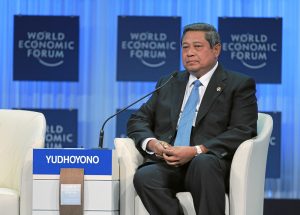Susilo Bambang Yudhoyono, commonly known as SBY, wrapped up his second term as Indonesia’s president in October 2014. His ten years in office were marked by increasing political and economic stability after the turmoil of the late 1990s, and he remains broadly popular. Yet when his term ended there was a sense that he had not really lived up to his potential as a transformational figure, coasting on booming global demand for commodity exports while glossing over deeper structural problems. The main criticisms on the economic front were that he hadn’t made much progress on infrastructure or manufacturing, a feeling typified by this headline that ran in the Jakarta Post on September 18, 2014: “SBY economic legacy will cloud Jokowi’s prospects.”
Now that some time has passed, I think it’s worth taking a look back on that legacy. Quite a few important reforms and legislative acts were passed under SBY which may not have seemed that important at the time but have had substantial impacts in the years since. One of the most important was Law Number 2 of 2012 on Land Acquisition, passed in his second term. It codified into law the state’s power of eminent domain and established clear procedures for landowners to be compensated and to contest the state’s claims.
Before the law went into effect, the state’s right to eminent domain was murky at best and acquiring land was a frequent impediment to any kind of big infrastructure project, especially after decentralization. Conflicts over land and the state’s right to appropriate it in the public interest are complex. But on balance, I think it’s preferable to have this law than to not have it. By bringing some clarity to this area the law has been instrumental in many of the large-scale infrastructure projects that have characterized Jokowi’s presidency. It may be true that during his time in office, SBY did not oversee a lot of infrastructure construction himself. But with this law, he helped create an important mechanism for his successor to do so.
In manufacturing, we are also starting to see the effect of SBY-era actions showing up in today’s industrial production. One example is the 2012 defense production law that required the Indonesian Armed Forces to source their arms and equipment from local manufacturers, if possible. In 2012 – and if we’re being honest, even today in some quarters – this probably seemed like madness. But it has forced some of Indonesia’s defense manufacturers to step up their games, and get more aggressive in acquiring technology and boosting their capabilities.
State-owned shipbuilder PAL recently produced the first locally assembled submarine in Southeast Asia (based on a South Korean technology sharing deal) and have received further capital injections to expand and scale up production capacity. We don’t know if PAL will eventually become a serious exporter of naval hardware but they are gradually building the manufacturing base to do so, and that can be traced back to actions that began in 2012.
Another case in point occurred in 2014 when SBY banned the export of raw nickel ore. For a president widely seen as coasting on commodity exports, this was a gutsy move and not particularly popular with Indonesia’s trading partners. By starving global markets of nickel ore, the goal was to force investment in higher value-added downstream activities. And it worked, with billions of dollars pouring into Indonesian nickel smelters in recent years. The end result is that Indonesia has an opportunity now to become an important player in global battery manufacturing, and perhaps in the production of electric vehicles.
I don’t want to come off as an SBY apologist here. There is obviously much to criticize about his time in office, as there is with any presidency. But I felt compelled to write this post because we live in a time where there is a lot of pressure to publish hot takes in response to breaking news, to make sweeping pronouncements on legacies and speculate about the course of future events which we cannot possibly know. The truth is that it usually takes many years before we can really evaluate the impact of a particular policy or a piece of legislation. It’s no surprise then that the economic legacy of an entire presidency might begin to look different as it’s reshaped by the passage of time, and may prove to be more consequential then people realized at the time.
































